CAW Community Champion Awards
The purpose of the CAW Community Champion Award is to recognize local leaders who put climate-related research and outreach to work, often in conjunction with CAW members. Since 2015, CAW has recognized one or two award winners each year at the NH Climate Summit. This page serves as an archive highlighting the CAW Community Champion award winners over time.
To learn more about the role community champions play in adopting climate adaptation strategies in coastal communities and understand how professional climate adaptation assistance providers can best support these champions, see Sustaining Champions of Climate Adaptation in Coastal Communities: Northern New England Study (Alexandra Philip, 2014).
2024
Kristen Murphy
Kristen is the Conservation and Sustainability Planner for the town of Exeter. She also volunteers on the Open Lands Committee and the Conservation Commission in Dover. Kristen knows how to think outside the box and work beyond her municipal boundaries. Kristen exemplifies the CAW Guiding Principles of Creating Community and Catalyzing Action. Kristen is an oft-requested advisor and contributor to projects relevant not only for Exeter, but for other communities within the coastal watershed. She has participated in or advised on regional projects including the Eelgrass Resilience Project, Flood Ready Neighborhoods, CAW Path to Resilience, and the Great Bay 2030 Engagement and Stewardship workgroup to name a few. Kristen is a valued member of CAW and contributor to CAW Talks, a peer-to-peer learning cohort of coastal community leaders focused on building climate resilience. She has a knack for gently reframing challenges as an opportunity, which seems to help others let down their guard and think more creatively. Photo Credit: Olivia Falcingo, seacoastonline
Kristen has led or collaborated on innumerable efforts for the town of Exeter. Her local knowledge, strong relationships, and experience with planning, policy, and permitting improve the likely success of local projects – projects like the C-RiSe vulnerability assessment in 2017, a climate open house in 2018, the Exeter Water Trail, an All–Boards Climate Forum in 2020 which she then helped bring to Dover in 2022, various land protection and stewardship projects, improvements to planning and zoning in Exeter, and standing up Exeter’s Sustainability Advisory Committee, among other efforts. Kristen’s resourcefulness and responsiveness also extend to her ability to access funding. She has received grants from the NHDES Coastal Program and the Piscataqua Region Estuaries Partnership. She successfully secured a Department of Energy grant for Exeter that is providing funding and support to manufactured home communities to increase energy efficiency. Kristen is a fantastic communicator, resource person, community builder and catalyst for action. She is an example of a community leader who simultaneously strengthens knowledge, capacity, and connections in ways that benefit her community and all of us.
Jason Bachand
Jason is the town planner for Hampton where his thoughtful, dependable, and collaborative leadership style is making a difference. Jason has several notable climate-related achievements in the past few years. Two particular efforts demonstrate Jason’s ability to develop both high quality products and high quality processes, a winning combination for getting things done. Jason’s nomination highlighted his work with Hampton’s master plan AND his work in developing the state’s first zoning ordinance that regulates development based on expected sea-level rise. For Hampton’s Master Plan “Our Town, Our Future,” Jason embarked on a dedicated effort to include a Coastal Resilience section. He assembled funding from grants and town sources to support public participation (mid-pandemic!). He conducted focus groups and surveys, used creative telephone techniques, and hosted many meetings. The resulting Master Plan included a strong emphasis on both climate resilience and housing issues and reflected the public input. The approach Jason used helped ensure that the Master Plan would be more likely to be approved, which it was in early 2023. For the past 20+ months, Jason has been leading the Master Plan Implementation committee further demonstrating his commitment to advancing adaptation approaches prioritized in the Plan.
Photo Credit: Rich Beauchesne, seacoastonline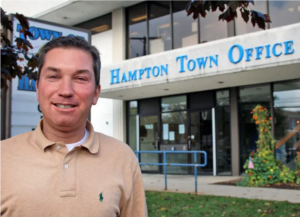
2022
 Jennifer Hale
Jennifer Hale
As the Director of Public Works for the Town of Hampton, Jennifer Hale works closely with the Town’s Planning Office to establish the best practice for incorporating resilience into floodplain management standards and local ordinances. She also participates in Hampton’s Coastal Hazards Adaptation Team (CHAT) where she shares relevant data, resources, and information with those who need it. Through collaboration, Jen has turned recommendations into robust projects that take a holistic approach to mitigating flood risk. Her cross-discipline, community-engaged approach is a north star for effective adaptation work in New Hampshire’s seacoast.
 Gretchen Young
Gretchen Young
Gretchen Young, the Environmental Projects Manager for the City of Dover, similarly demonstrates through her work the creative progress that can be made through collaboration. In recognition of aging infrastructure, increased flood risk, and the unavoidable cost of improvement, Gretchen brought together an ad-hoc committee to evaluate various funding strategies to enhance stormwater and flood resilience. At the outset, she understood this process of convening business representatives, developers, property owners, and environmental advocates would not be easy. However, by bringing people together to articulate and address opposition, Gretchen was able to build unanimous support for a stormwater utility. Gretchen’s collaborative leadership will guide not only the City of Dover towards a more resilient future but also provides an exemplary model for surrounding municipalities as they come together to address interconnected and compounding risks.
2021
Rayann Dionne, Vice President and Treasurer of the Seabrook-Hamptons Estuary Alliance
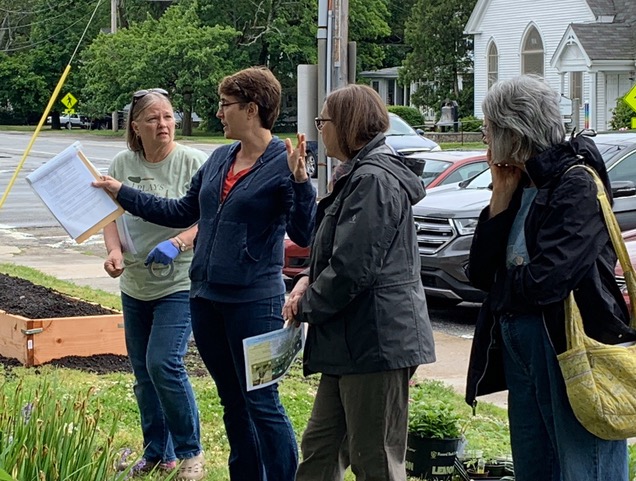
This year’s award winner was nominated, not only for what she does, but also for how she does it. The 2021 CAW Community Champion Award goes to Rayann Dionne.
From 2008 through December, 2020, Rayann was the Conservation Coordinator for the town of Hampton. She is also a founding Board member, and Vice President and Treasurer of the Seabrook-Hamptons Estuary Alliance.
As a result of her work, Rayann has “influenced the course of the town’s actions, its investments in assessing climate related hazards, and its willingness to address the very real impacts of climate change on the community and its resources.”
Rayann’s nomination for this award is striking for the level of enthusiasm and support expressed by colleagues, municipal board members, and program partners.
One nominator summed up Rayann’s impact on climate adaptation in Hampton by writing, “How lucky was I to work alongside Rayann Dionne, from technical research, to community engagement, to presentations before boards, commissions and elected officials, Ryann’s voice was steadfast, her message to act was clear. Rayann was always a wealth of information, a powerhouse of energy, and a positive force that moved Hampton forward toward action. Her dedication to community and excellence in her work make her a true champion in every aspect of the CAW Community Champion award.”
Rayann took the Coordinator position from being a support position for the Conservation Commission and Planning Board to having a significant role in municipal decision-making on issues related to conservation, wetlands, storm water management, impervious coverage, and most, if not all, of the complex issues related to flood plain management. She was instrumental in guiding Hampton toward participation in FEMA’s Community Rating System. She created the Conservation Commission’s unique painted rain barrel program in which donated rain barrels were painted by middle or high school students and then auctioned at the Hampton Garden Club annual plant sale. She managed the installation of a demonstration rain garden at the town’s library. She organized clean-ups, a BioBlitz, and snow shoe tours in the Town Forest. In her role with SHEA, Rayann has designed and run numerous workshops on topics ranging from Flood Safety and Emergency Preparedness to Salt Marsh Ditching, and Birds of The Estuary. She is working with teachers at the local high school to involve their students in projects to measure and improve the health of the estuary. She has helped guide Hampton’s Coastal Hazards Adaptation Team, and is involved in all aspects of creating a unique management plan for the Hampton-Seabrook Estuary, including as a member of the steering committee for the Hampton-Seabrook Science Collaborative.
If you’re sensing that Rayann is knowledgeable, creative, compassionate, a master at multi-tasking, and unstoppable, you are right. Congratulations to the 2021 CAW Community Champion, Rayann Dionne.
2019
Todd Selig, Administrator, Town of Durham
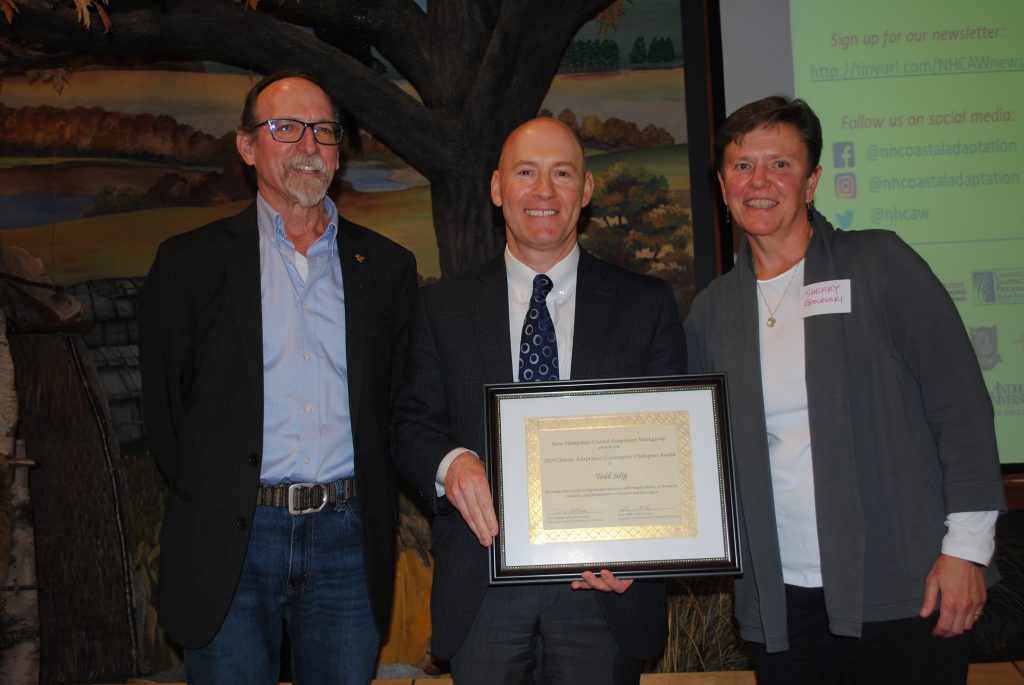
While Durham prides itself with being a progressive community and one that is unafraid of being first, Todd finds value in identifying and evaluating other climate-resilience projects in surrounding communities, or in other parts of the country, and how they can be adapted in Durham. He makes it a point to stay up to date with ever changing climate science by reading scientific reports and assessments, following national news coverage and reporting, and attending CAW sponsored workshops and conferences. Todd is always on the look-out for new information and how it can be used to advise the public and local decision-makers to influence change.
Todd has volunteered his time to present Durham’s climate change initiatives at workshops and conferences and has written several opinion pieces that have been shared in local and national daily newspapers. He summarizes ongoing climate related projects to Durham’s Leadership Team, Town Council, and other various boards and commissions he interacts with. Todd understands the importance of providing education to the public and promotes the use of the Town’s weekly Friday Updates, Twitter, and Facebook presence to keep residents informed on both regional and local resilience efforts.
Todd has been actively involved in several resilience projects, including: oversight on the development of the energy and natural resource chapters of the master plan, installation of climate art signs, completion of a sea-level rise vulnerability assessment, update to the town’s hazard mitigation plan, adoption of more stringent floodplain regulations and the state’s first use of advisory zones for sea-level rise, and the construction of a living shoreline at Wagon Hill. He has also advocated for two upcoming projects that include a groundwater modeling study and the creation of a standalone climate adaptation master plan chapter.
Many of the climate-related efforts Todd has supported go well beyond his professional scope of work as town administrator and emergency management director, including his participation in the climate in the classroom series, climate remembrance project, and yearly King Tide photo contest.
Todd’s role as town administrator and emergency management director allow him to work directly with other local government staff on a variety of regional issues including transportation, housing, water resource protection, and climate adaptation planning. Many of the efforts Durham has undertaken can be used as a model for other communities to replicate.
2018
PETER BRITZ, ENVIRONMENTAL PLANNER, CITY OF PORTSMOUTH
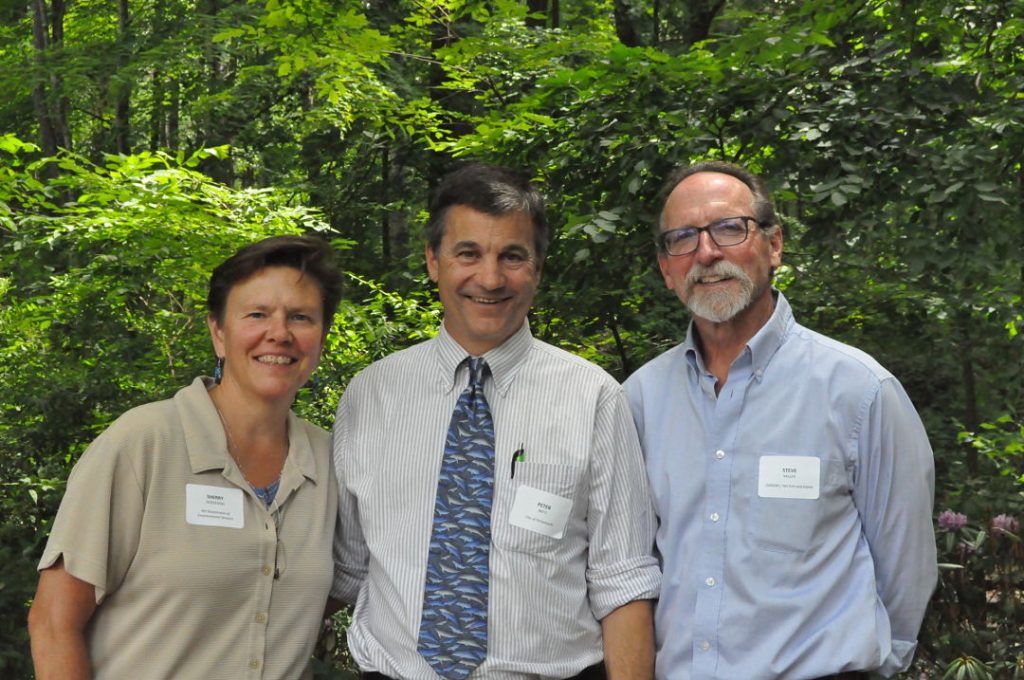
Peter is Portsmouth’s Environmental Planner and Sustainability Coordinator. He is also an indispensable member of CAW who helps keep the municipal perspective front and center in the work that CAW does. A review of Peter’s “climate champion” creds is a textbook case. Does he keep informed about climate related community resilience? Check. Does he inform or engage others? Check. Does he take actions that advance climate resilience research, outreach, planning, policy, regulation, or practice? Check, check, check. Some might argue that these efforts are all part of Peter’s job, and they are; however, there’s evidence that Peter goes above and beyond those official responsibilities. It’s said that cities are leading the way with climate adaptation, and Portsmouth, with Peter’s help, is an example of that.
Peter consistently heightens CAW members’ awareness of what many New England coastal communities face – development pressure, historic legacies, cultural attractions, natural resource pockets, a commitment to local control, and people with diverse interests. With all these interests, it’s fortunate that Peter is a collaborator – whether working with researchers, meeting with City Council, or leading residents on a sea-level rise walking tour.
Peter has applied for and received several grants to fund adaptation work in Portsmouth – including the Portsmouth Coastal Resilience Initiative and a Historic Vulnerability Assessment. Peter recognizes the role that natural resource protection plays in providing a foundation for resilience, and he acts on it by updating and improving city ordinances, initiating a vernal pool study, and leading the Public Undeveloped Lands Assessment. As noted in his nomination for this award, “Peter is always looking for innovative ways to build resilience and improve the quality of life for Portsmouth residents.” We applaud all he has accomplished for that goal.
DIANE HARDY, PLANNER, TOWN OF NEWMARKET
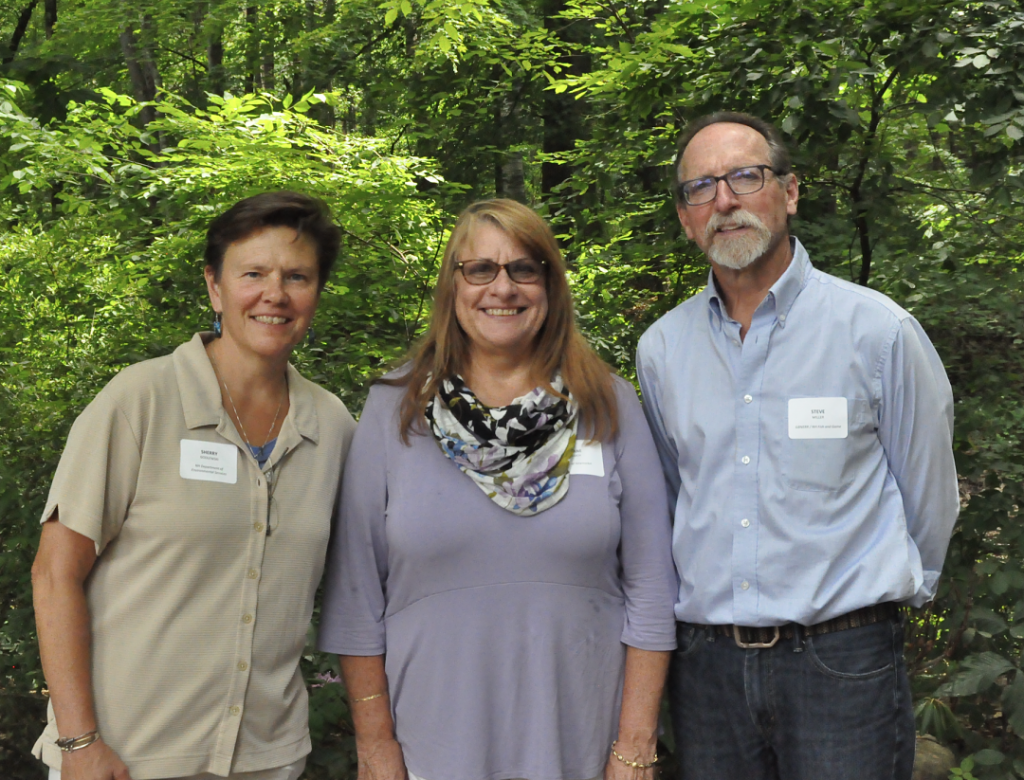
Diane is Newmarket’s town planner and acts as the Planning Department’s representative to the Planning Board and Zoning Board of Adjustment. Diane’s climate adaptation efforts resemble a mosaic of activities that have resulted in a striking montage of resilience planning for Newmarket. Over the past several years, Diane has been involved in:
- A public engagement process to update the town’s master plan vision chapter, which now incorporates a stronger focus on improving climate resiliency,
- an engineering study aimed at reducing flooding impacts in the Moonlight Brook watershed, and
- the design of a new culvert on Bay Road that will allow for future salt marsh migration near Lubberland Creek.
Recently, Diane worked to include projected coastal flooding due to sea-level rise in the town’s 2018 Hazard Mitigation Plan and revise the town’s stormwater regulations. She also was involved with a modeling study to investigate the potential vulnerability of public drinking water supplies to groundwater rise and saltwater intrusion.
Aside from these specific initiatives, Diane’s contributions have had a much wider impact. She keeps municipal board members and Newmarket residents apprised of climate projects going on in town and has contributed to regional projects, such as serving on an advisory committee for a floodplain study for the Lamprey River. Many of the projects that Newmarket has undertaken can serve as a model for other coastal communities. Diane is widely recognized as a regional leader in identifying climate-related challenges and embracing innovative solutions to reduce risk. Her level of detail, enthusiasm, and commitment to achieving Newmarket’s vision and resilience goals are a source of admiration and respect.
Colleagues at the Strafford Regional Planning Commission describe Diane as someone who demonstrates “what it means to be a responsible and successful planner”; “maintains a professional standard, even during difficult and often complicated discussions”; and exhibits “the uncanny ability to get things done,” despite hurdles.
NEWS ARTICLE: COASTAL ADAPTATION GROUP HONORS LOCAL PREPAREDNESS WORK
2017
STEVE BIRD, CITY PLANNER, CITY OF DOVER
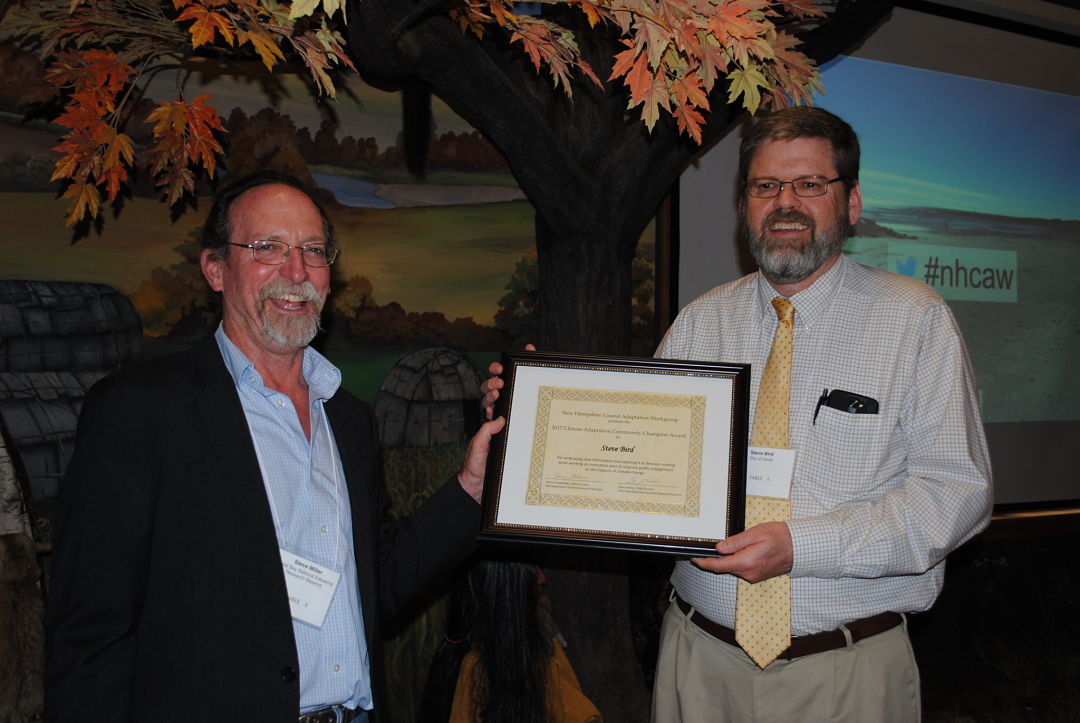
The unanimous choice of the award selection committee, Steve Bird was recognized for serving the City of Dover, NH, in a professional capacity and for his exemplary efforts to integrate climate-related information into local decision-making.
Bird’s many contributions are often voluntary and above and beyond his official responsibilities. Always on the look-out for new information and how it can be used to inform local decision-making, Bird’s nomination notes that he is constantly evaluating what other climate-resiliency projects are happening in surrounding communities and how they could potentially be applied to influence change in the City of Dover. He embraces innovative ways to increase public awareness about climate change risk and adaptation opportunities and has worked on several projects to expand the City’s transparency and improve processes to engage the public in the identification of climate impacts.
Finally, while Bird’s position as City Planner may limit the extent to which he can directly engage with neighboring communities, it is clear that his resilience planning efforts already do and will continue to serve as a model for surrounding communities. As a result, Bird is frequently asked and consistently volunteers to share Dover’s climate adaptation experience with various boards and commissions within the City, as well as with audiences at workshops and conferences within the greater region.
Bird’s nomination commends his “level of detail, enthusiasm, and commitment to achieving the [climate adaptation] goals of the City” and emphasizes how “he certainly deserves this award and should be recognized for his efforts.”
2016
KIM REED, PLANNING AND ZONING ADMINISTRATOR, TOWN OF RYE
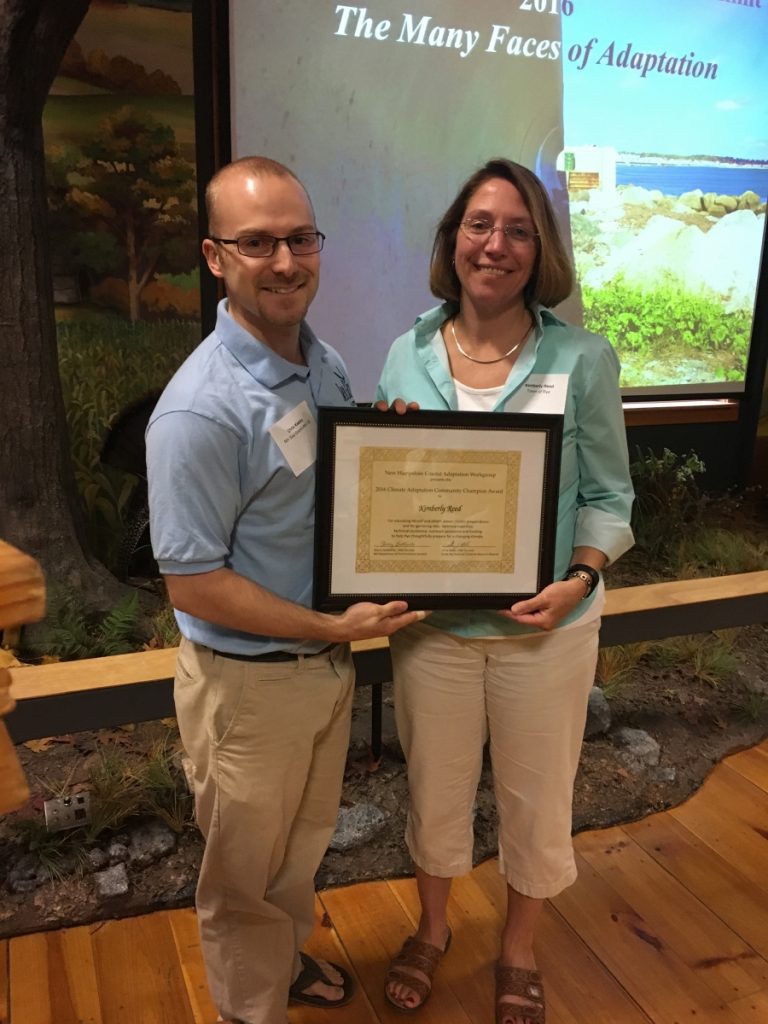
The individual who nominated Kim Reed for the award noted that, “[Reed] is a true climate champion for the Town of Rye. Her professional work in climate change planning and adaptation is driven by her personal interest in the topic and strong belief that her community needs to be proactive in its approach to protect its coastal assets and resources.”
Reed has supported many local climate projects over the years, including:
- Enrolling her community in FEMA’s Community Rating System, and
- Preparing a new Coastal Hazards and Adaptation Chapter for the Master Plan
Her nomination was supported by strong letters of recommendation:
As evidence of her ability to catalyze action, one peer describes her as “the spark plug in the Town of Rye in bringing recognition to the need for climate adaptation action.
As evidence of her dedication, another peer writes, “She simply does not give up. When she encounters a challenge, she digs in harder and persists until an answer is found.”
As evidence of her success, a colleague writes, “We are now seeing that work pay dividends as the information finds its way into town planning documents.”
In summary, Reed “catalyzes action, she is dedicated, and she has shown success. She serves as a FEMA Certified Floodplain Manager, assistant Emergency Management Director, and the Planning and Zoning Administrator for the Town of Rye.”
NH SEA GRANT BLOG POST: KIM REED RECEIVES 2016 CAW CLIMATE CHAMPION AWARD
2015
SYLVIA VON AULOCK, FORMER PLANNER, TOWN OF EXETER
As a professional planner, Sylvia’s efforts to advance climate preparedness in Exeter went above and beyond the requirements of her job. She has been a frequent attendee at CAW workshops and has made a point of learning what is going on in other seacoast communities related to climate preparedness in order to serve the community where she works. Sylvia regularly draws from her planning, civil engineering, and landscape architecture backgrounds to contribute to the education of others at events, sponsored or hosted by CAW members. She was instrumental in getting Exeter involved in the Climate Adaptation Plan for Exeter or CAPE project and has assisted with transferring that project model to Rhode Island and Delaware. Perhaps most importantly, Sylvia is known for keeping project partners grounded and attentive to what matters most in a community.
Sylvia voluntarily agreed to participate in the CAPE project, which was a “huge undertaking that added to her work load and responsibilities, doing so because she knew it would help Exeter.”
JAY DIENER, PRESIDENT, SEABROOK-HAMPTONS ESTUARY ALLIANCE
Jay has been working to advance climate preparedness for years. He is a frequent attendee at CAW workshops and in 2011 worked with three towns on one of the region’s first climate adaptation projects. That project used an economic impact model to examine local effects of sea-level rise and storm surge. In 2014, Jay rolled up his sleeves with other community members participating in the Preparing for Climate Change program, serving as a steering committee leader to guide a workshop series for the towns of Hampton, Hampton Falls, and Seabrook. He is a founder of the Seabrook-Hamptons Estuary Alliance, a three-town working group that unites the estuary’s towns on watershed challenges like climate change. And, even before founding the Seabrook Hampton Estuary Alliance, Jay served on the board and as chair of the Great Bay Stewards, where he encouraged the Stewards to invest and participate in climate related activities. Jay also served on a climate panel convened by Senator Jeanne Shaheen.
Jay “is competent, reliable, unflappable in the face of state and municipal bureaucracy, and just a nice guy to work with who wants to see good things happen in the region.”

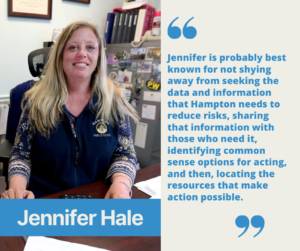 Jennifer Hale
Jennifer Hale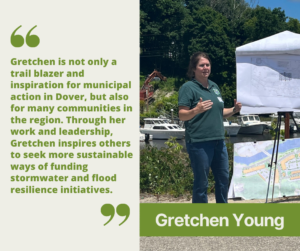 Gretchen Young
Gretchen Young